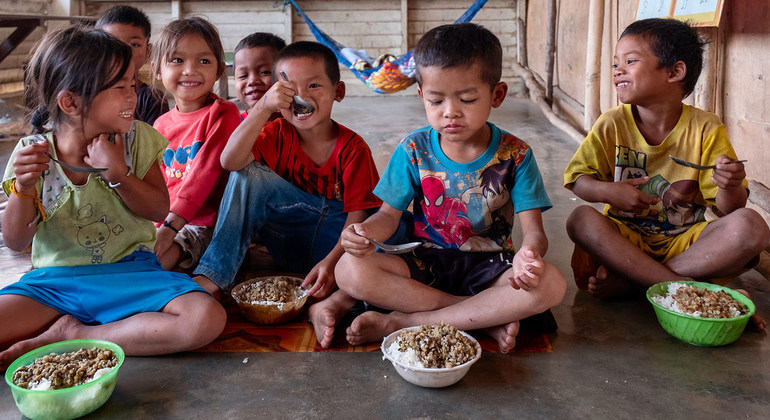Number of hungry people rising globally
More people are going hungry around the world, a new UN report, the State of Food Security and Nutrition in the World 2019, revealed on Monday.
The news means that achieving the Zero Hunger target of the Sustainable Development Goals (SDGs) by 2030, will be an “immense challenge”.
This year’s report, which was launched during the (HLPF) – the main UN platform monitoring follow-up on States’ actions on the SDGs – takes a broader look at the impact of food insecurity, and introduces, for the first time, a new indicator: a lack of access to “nutritious and sufficient food”. This affects some 1.3 billion people.
Read the full story here.
20 million children are missing out on lifesaving vaccines
More than one in 10 children – almost 20 million worldwide – failed to receive potentially lifesaving vaccines in 2018, the UN said on Monday, citing obstacles including conflict, cost and complacency.
According to a joint study by the World Health Organization (WHO) and UN Children’s Fund (UNICEF), most unvaccinated children come from the world’s poorest countries and a disproportionate number live in fragile or conflict-affected States.
10 countries accounted for almost two-thirds of the 19.4 million under and non-vaccinated youngsters in the world: Nigeria alone accounts for three million.
Measles continues to be a growing cause of concern, with the total number of cases worldwide doubling between 2017 and 2018, to more than 340,000.
Our full story is here.
DR Congo health worker killings highlight need for stronger Ebola response
Deadly attacks on health workers in Ebola-hit areas of the Democratic Republic of the Congo (DRC), including one at the weekend that left two dead, show that combatting the disease outbreak will require far greater international support, UN emergency relief chief Mark Lowcock said on Monday.
Since the latest Ebola outbreak was officially declared in the east of the country last August, there have been more than 2,400 confirmed and probable cases, and 1,647 deaths, according to latest data from the country’s authorities.
Almost 200 health facilities and workers have been attacked since January, with seven killed in the violence to date.
World Health Organization (WHO) Director-General Tedros Adhanom Ghebreyesus said the two workers who died on the weekend were “murdered in their home”.
End ‘violations against children’ in Mali, says UN expert
Expressing concern for the “deteriorating security situation” in Mali, the Special Representative of the UN Secretary-General for Children and Armed Conflict, Virginia Gamba, released a statement on Monday calling for an end to “grave violations against children”, in tandem with a return to peace and stability.
Ms. Gamba’s call came after her first mission to Mali, during which she met the country’s Prime Minister, other senior politicians, and members of civil society.
The importance of education was highlighted by the senior UN official, who noted that 900 schools were closed, as of May. She also called for stronger child protection legislation that includes provisions for children affected by conflict, and emphasized that each child should be given the right to an identity through birth registration.
Ms. Gamba urged the Government to harmonize national laws with child protection standards, and discussed the creation of a national prevention plan with the Prime Minister; she also suggested that Mali could lead a regional prevention plan to prevent violations against children in the whole region.
Tackling youth unemployment: World Youth Skills Day
Today is World Youth Skills Day, and the UN is raising awareness of the importance of developing skills and training, in order to be fit for today’s job market.
Some 73 million young people are currently unemployed, with 40 million joining the labour market each year. To tackle the problem, at least 475 million new jobs need to be created over the next decade.
The UN believes that vocational skills and education can help young people access the world of work, and start their own businesses; and make young people more resilient in the face of a market that demands more flexibility than ever before.
Vocational training can also reduce access barriers to the world of work, through work-based learning, and ensuring that skills gained are recognised and certified; and offer skills development opportunities for low-skilled people who are unemployed.
See more on this story here.






